Elex hands-on – can this game turn out to be a great RPG?
Apparently, the team at Piranha Bytes looked to the first Gothic games as source of inspiration for Elex. True, world design and gameplay model bear some resemblance to those classics, but the prehistoric technology is a different thing altogether…
Frankly, I’ve never been as conflicted about a video game as I was after seeing Elex presentation In London last week. I have tremendous respect for the works of Piranha Bytes and I wish the team all the best, I really do. But the two hours I spent with the beta version of their latest title left me running hot and cold. On the one hand, the game features all the characteristic traits of a Piranha game, and these will probably once again gain admiration and sincere love from the fans (despite the rather drastic change of setting). On the other hand, you can’t help but think that the German developer is falling more and more behind the times, and not just when it comes to technology but also matters that are much more substantial.
What starts bad... goes bad?
Let’s start from the beginning though, and quite literally, as in London I was given the opportunity to play through the game’s prologue chapter. This means I had a taste of probably the most important gameplay section in Piranha games – the first moments, during which the creators usually charm the player with their world building and atmosphere (or tease the story). The prologues were – in my opinion, at least – the cornerstones of the Gothic series, determining whether the gamer gets sucked into the adventure and spends the next several dozen hours playing the game, or not.
Is Elex love at first sight? Unfortunately, there are some problems with that. The mood building is left to an animated intro (released some time ago on the net – you can watch it above) and a short cut-scene running on the game engine, which shows how the aircraft of the protagonist is shot down, leaving him a stranded survivor, stripped of his power (represented mainly by his gear and the presence of elex in his organism) in the middle of wilderness. And while both cinematics depicted some very dramatic events – a disaster, a betrayal, and a near death experience for the protagonist – it was all surprisingly bland. The game failed to deliver a significant load of emotion in those first, critical moments.
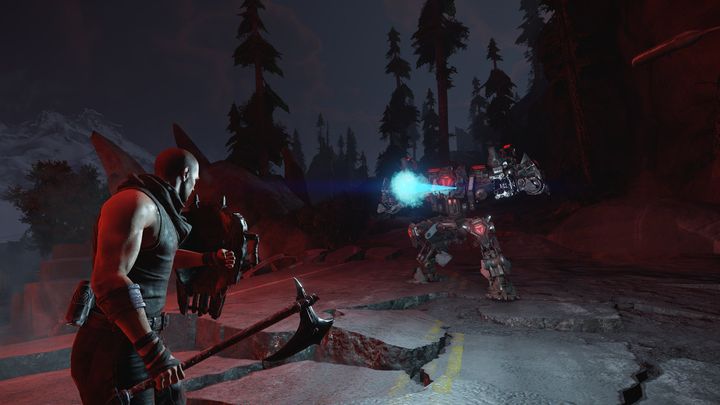
Perhaps I’m the one at fault, focusing mostly on the technical aspects of what was shown to me? Could I have missed the atmosphere and beauty of Magalan because I was stuck on stiff movement animations, cheap special effects, objects overlapping, and lifeless characters (both in appearance and in behavior)? Or perhaps it was the narrative that was at fault? The game is trying to make us bond with the protagonist, by showing his personal tragedy and betrayal at the hands of his kinsmen, when all we know about him is his name, Jax, and the fact that he’s a “valued commander” of the Alb military – could this be the problem? You have to admit that it’s not enough to feel a connection with the protagonist. Although it’s still a big step forward for Piranha Bytes when it comes to presentation of the main character.
Welcome to The Valley of M... Magalan
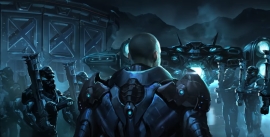
Albs are one of the four main factions inhabiting the planet Magalan. It’s an evil army drawing its strength from repeated usage of a substance known as elex. While most humans become mindless mutants after consuming the substance for longer periods of time, Albs seem to be resistant to this effect to some degree, retaining their sanity for the price of being stripped of their emotions and having unnaturally pale skin. Forced withdrawal from elex suffered by the protagonist due to the events shown in the game’s prologue results in him partially regaining his humanity, although it also significantly weakens him and causes him to lose all of his “powers”
But let’s put plot-related discussions aside for now. After all, we’re stuck in the middle of a jungle and we need to get back on our own two feet. We may have been a “valued commander” not so long ago, but now – one crash landing and one laser wound later – we’re just a miserable greenhorn with a steel pipe, surrounded by ruins and wild beasts. In other words, we’re at the beginning of a Gothic-like adventure. And that, by itself, is a very pleasant experience. When a mere mutated rat poses a grave threat, you need to keep a close look at your surroundings, because any piece of junk may save your life – and because the locations are interesting and the loot was placed with some thought this exploration is fun. Of course, you need to be careful not to step into a nest of some deadly vermin that’s way over your character level. Yep, you’ve heard me right – who needs level scaling?
Having immersed myself in this Gothic-like atmosphere, I’ve finally cleared the ruins where I was completing a brief tutorial. That’s when I met Dieg… I mean Duras – a friendly Berserker warrior. And that's when the magic was gone. Despite the rather high difficulty level, the devs take their time in the beginning to try and introduce, at least briefly, the casual player to the rules governing this world – through Duras. In a straightforward fashion that makes the fourth wall creak and bend, he informs the player that joining one of the factions is the only way to get somewhere on Magalan. Do not worry though, my dear play… I mean traveler, for now you can complete tasks for all of them (in fact, you should do it), you’ll make the final choice when the time is right. Cool, I get it, now I know what the game’s all about; except the mood’s gone with the wind.
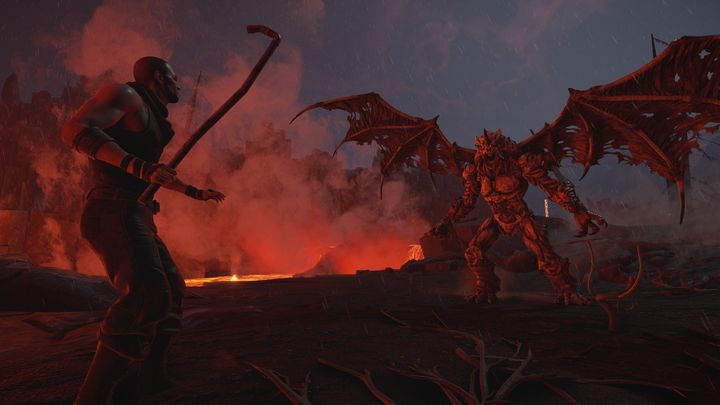
In fact, immersion problems in Elex may appear to some as early as during the intro. The problem is… the entire premise on which the world is built. I know that a mix of science fiction and fantasy is nothing new, but somehow I just don’t buy they way Magalan is constructed as a setting – somehow this particular combination feels artificial and internally inconsistent. I see absolutely no reasons for the Berserkers, armed with cold-steel weapons and ornate plate armors, to face off against factions such as the Clerics with their laser rifles and mechs. How come one side lives in dwellings made of wood and stone, the other protects its homes with force fields, and yet somehow they can fight on equal footing? Sure, both factions have their ideological explanations, but I can’t help but think that the true – and only valid – reason for this state of affairs are the game mechanics. Bye-bye immersion, it was nice knowing you.
Of course, this particular cognitive dissonance is just my impression. I suppose many of you will be able to easily look past the fact that there are Humvee-like vehicle lying and rusting in the ditches with monsters pulled straight from Gothic or Risen living just beside them. Perhaps you’ll approach the matter in a much more pragmatic way, focusing on the fact that you’ve been given a vast, diversified world to explore (it’s a single, coherent landmass instead of islands), full of breathtaking sights and intriguing, dark corners only the bravest will dare to explore. Obviously, in two hours I wouldn’t possibly be able to explore all of it, but having roamed the area around the Berserker settlement and watched the promo materials published earlier, I believe that explorers will once again be pleased with what Piranha Bytes has prepared for them.
By laser and by sword
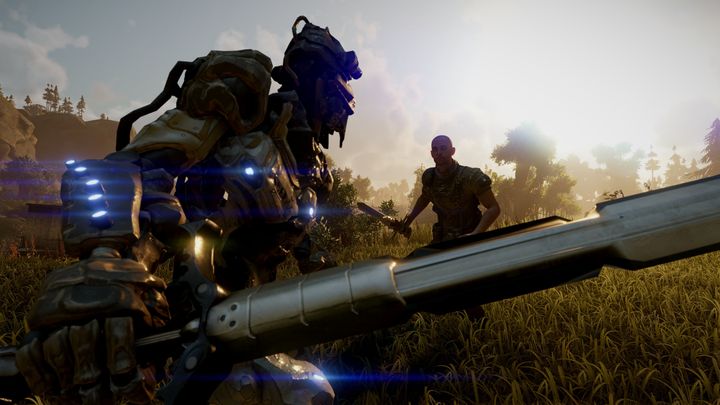
But hey, what about the story-first players? Again – two hours is hardly enough to judge, but… it appeared to me that the story isn’t going to be Elex’s strongest asset. Although the plot is supposed to be personal, I can’t see myself growing too fond of the protagonist – Jax is sort of like Geralt, but without the edgy personality and the defining background, it’s probable the players will have a hard time relating to him. The character creation in general is all over the place – it’s hard to name even a few characters who would stand out, have any charisma or at least something interesting to say. Generally, the dialogues lack panache. The die-hard fans of Piranha Bytes have probably grown accustomed to this over the years, and maybe they will actually find that Jax’s austere countenance and cool, deep voice are enough to from a bond with him. After all, it wasn’t the captivating plotline that made Gothic and Risen the great games they were.
The quests themselves are more important. Working against the clock, I didn’t have a chance to witness too many missions, but the few tasks given to me by the Berserkers seemed to be a solid chunk of quest writing: investigating a murder, infiltrating hostile factions, looking for a replacement for a tired gatekeeper – there are hardly any fetch quests, which often filled the German developer’s RPGs – which is not to say there are none at all. When I asked him about the quests, Reinhard Police, a THQ Nordic producer currently working with Piranha Bytes, told me that when it comes to quests, they would like to achieve a feel similar to the original Gothic – nevertheless, it was also decided that some minor quests ought to be included, such as searching for items etc. According to Police, such missions can help with improving e.g. the character’s crafting skills.
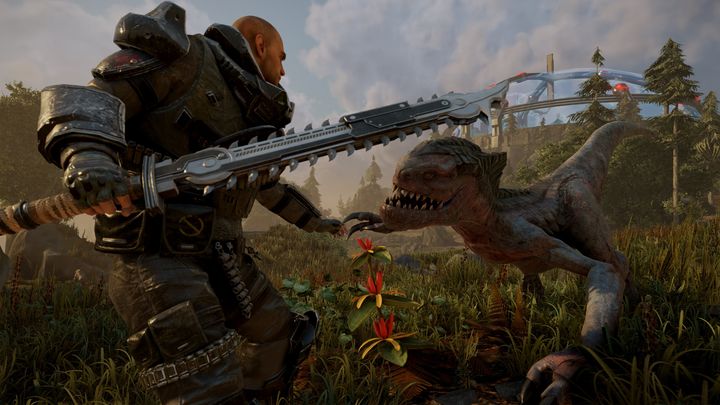
Then, there are the RPG elements – here, depth should be provided by solutions known from Risen 3. Apparently Elex also ascribes significant importance to companions – the game informs about how certain characters feel about the dialogue options the player has chosen; the journal has a whole section devoted only to companion quests – a morality system similar to the one known from Titan Lords. This time, it’s our attitude towards NPCs (and elex usage) that determines how “cold” the protagonist is. The devs spoke of the possibility of turning into a mindless zombie earlier before the release, but when I asked about that, Police told me that the whole thing boils down to variations in relations with the NPCs. Looks like there won’t be a revolution in this respect.
A LIVING (?) WORLD
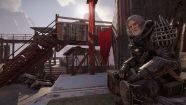
The realistic conduct of the NPCs was one of the greatest advantages of the original Gothic, so when playing Elex, I figured it was worth investigating if it were still there. Well, it is… sort of. The Berserkers have their daily routines, yelled at me if I was trespassing, and became aggressive if I drew my weapon. They even minded if I was browsing the interface (which works like Pip-Boy from one of the new Fallouts, except it doesn’t freeze time).
Too bad that most of these are probably just empty reactions, and the remaining patterns of behavior are sometimes downright silly. When I was caught stealing, the Berserkers just decided to chop me up with their swords on site, without offering any chance to redeem my moment of weakness (maybe that’s their idea of justice, who knows). I could live with the immediate attack. The thing is, however, that the need to finish off the knocked-down enemy has been discarded – whoever runs out of their healthbar becomes dead as a herring. It seems like a minor simplification, but it has a really bad effect on the immersion, at least in my opinion. The generic conversations between NPCs didn’t turn out very good either, as most of the time they just uttered random lines – sometimes in turns, sometimes simultaneously.
Don’t flail it so much, sir
There was no revolution spotted in the combat department either. Instead, another step towards a Dark Souls-ish system was made. It’s mainly visible with the stamina bar that was added to the known mechanics of different attacks, dodges, etc., which was, in my opinion, a mistake. A “Souls” combat system must be precise, responsive and dynamic, with smooth animations that allow you to watch the enemy and react to their movement. Elex fails to meet these requirements to any satisfying degree. Jax is sluggish in his responses to the player’s input as well as his movements (particularly the attacks). The enemies, on the other hand, have some AI-based issues, and tend to move in a bizarre manner – especially if they encounter environmental obstacles.
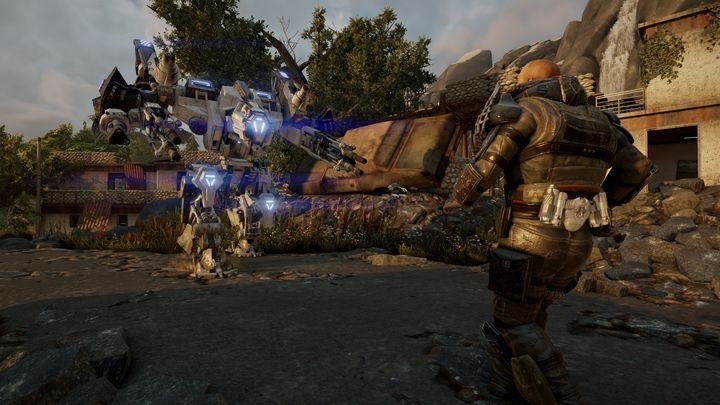
Shortly put, the combat mechanics don’t deliver a sense of confidence in your avatar and… just don’t look like much (although players who manage to defeat enemies on higher levels with an entry-level character after lengthy duels will surely find some satisfaction). Even the recent Technomancer – a game that used similar principles to the Piranha Bytes game – looks like a game with great combat. Let’s have some mercy and spare Elex another comparison with Geralt, even from the Assassins of Kings, or with any Souls-clone, like The Surge.
One might wonder if Elex makes the grade when it comes to shooting and ranged combat (since there’s some futurism involved in the game). Here I come with the answer: no, it doesn’t. In case of guns it may actually be worse: there are some rudimentary recoil mechanics, but all firearms resemble pellet guns. The shooting mechanics here are as “fun” as they were in the 10-year-old Fallout 3, which – in case you didn’t play it – wasn’t actually fantastic. Plus, the guns don’t deal that much damage, which makes sense from the point of view of mechanics – if we have a faction like the Berserkers, who rely on melee weapons, there’s no other way.
Can Piranha still bite?
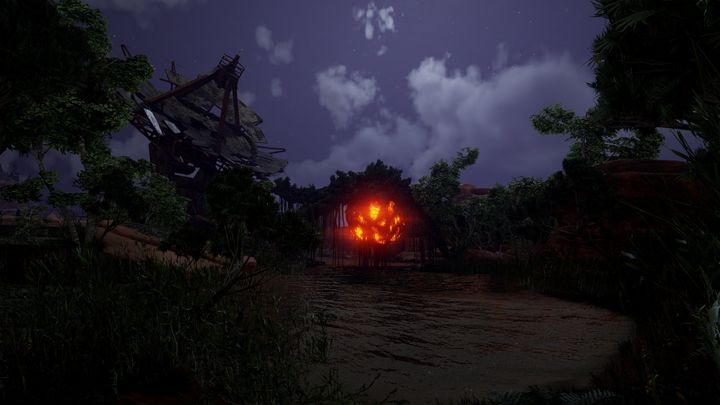
Time to wrap up my impressions. Of course, I could keep pointing out various technical shortcomings, mention unsatisfying optimization – for which there’s no excuse considering the mediocre graphics – or comment on the interface, on the one hand elegant and clear, but lacking some elementary features (especially the summary of Jax’s stats). Still, there’s no point doing all this now, several months before the release, since everything is still subject to change.
And that’s the ultimate question at this point: what can Piranha Bytes still polish in Elex before the October release date comes? I’m afraid that not enough. A handful of bugs will probably be eliminated, and optimization will get better, but will the developer deal with the overall “wooden” feel of the whole game? I doubt it.
Of course, it may turn out that the game will be great no matter how “wooden” it feels at the moment. That its entirety – the sum of all the elements that aren’t that impressive separately – will bring us to our knees. After all, a varying level of clunkiness is a “trademark” of every game of this developer, ever since Piranha Bytes made its first steps in the business; still, some of their works are true masterpieces. Will it be the case with Elex? We won’t find out until October 17, 2017. For now, all be can do is hope – with zeal and ardor – that the team that gave us Gothic still has a knack for making great RPGs.
